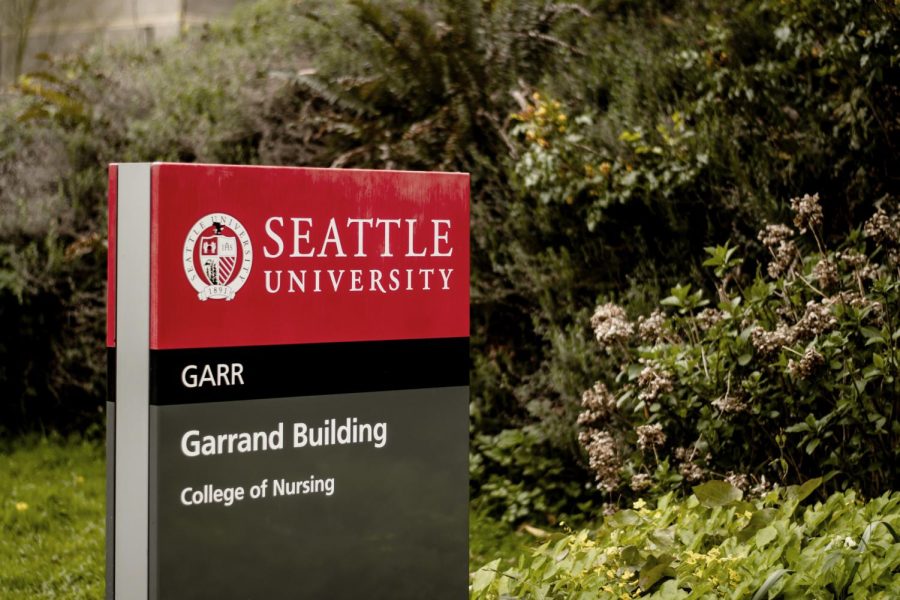Dean Swanson Retires From College of Nursing
Signage for the Garrand Building, home to the SU College of Nursing.
Following decades of influential research surrounding child and maternal health, Dr. Kristen M. Swanson PhD, RN, FAAN has rounded out her accomplished career as the Dean of Seattle University College of Nursing.
Obtaining her PhD from the University of Colorado in 1983, Swanson started studying the experiences of parents, physicians and nurses who cared for infants in newborn intensive care units, later implementing this knowledge into the development of caring-based nursing practices.
“From my dissertation, I developed a theory of caring. That theory is now used internationally to guide teaching, research and nursing practice,” Swanson wrote to The Spectator.
Swanson began her career at Seattle U’s College of Nursing in 2014, when the Doctor of Nursing Practice (DNP) was graduating roughly six students a year. Today, the College of Nursing graduates roughly 80 DNPs a year.
The size of Seattle U’s nursing program is not the only thing that has grown since Swanson started nine years ago. Dr. Bonnie Bowie, associate dean for graduate programs at Seattle U, attributed the college’s successful accreditations and the creation of a DNP degree to Swanson’s leadership.
“When COVID-19 hit, we had to pivot our clinical rotations from in-person to virtual in a matter of days. Kristen was not only proactive in creating an alternative plan for our students, but was a leader in how to approach COVID-19 issues in nursing education across Washington and nationally,” Bowie said. “It was Kristen who spearheaded the partnership with Swedish to provide a vaccination clinic during the pandemic.”
Swanson highlighted the positive relationships formed as a result of navigating the COVID-19 pandemic as well as growth within the College of Nursing.
“[I’m proud of] getting through the COVID-19 pandemic, launching the COVID-19 Vaccination Clinic in cooperation with Swedish, obtaining ten years of accreditation for our BSN, DNP and Nurse Midwifery Programs,” Swanson wrote. “[Also] being able to support graduate and undergraduate nursing students as well as Diagnostic Ultrasound students through to graduation in spite of the COVID-19 pandemic playing major havoc with clinical rotations. Of particular joy is watching the growth in grants and gift funds received in the last couple of years.”
In the midst of an ongoing lawsuit and state-wide nursing shortage, the College of Nursing’s impending leadership change is occurring in an environment of uncertainty. Bowie discussed faculty’s response to the retirement of Dean Swanson in the context of these issues.
“I think people have mixed feelings,” Bowie said. “It’s not really the change in leadership that will affect nursing education, but the ongoing challenges we face.”
While growth and progressive change have been hallmarks of Swanson’s deanship, the challenges that Bowie references loom large. Currently, the school finds itself on the receiving end of legal action.
The lawsuit, filed by current and former students of the College of Nursing, states that the college both marketed and collected tuition for a master’s program that they did not have the proper accreditations to offer.
In response to the allegations, Seattle U released a statement addressing the lawsuit.
“Although the university regrets the way information was communicated to doctoral students in 2020 about the proposed [Master of Science in Nursing] degree, any allegation that the university marketed or advertised the degree with an intent to deceive students is categorically false,” Lincoln Vander Veen, Seattle U’s external affairs manager, wrote in a statement to the media.
In addition, Washington faces a challenging nursing shortage. The state has thousands of vacancies, leading to an exorbitant financial expenditure on travel nurses from out of state. When the positions are not filled, most often in rural hospitals, wait times for patients can skyrocket. In a 2022 op-ed published in the Seattle Times, Swanson and Seattle U President Eduardo Peñalver outlined the challenges Seattle U and other educational institutions face in addressing the shortage.
“We must lift unnecessary regulatory burdens and address financial obstacles that stand in the way of higher education’s ability to increase admissions and solve this important public health challenge,” Peñalver and Swanson wrote.
While recent legislation, such as Senate Bill 5582, aims to help increase the breadth of educational opportunities available to nurses, they do not apply to private universities such as Seattle U. In spite of these challenges, Bowie and Swanson are both hopeful that the incoming dean, Butch de Castro, can work to perpetuate growth, sustain existing programs and enrich the College of Nursing’s diversity, equity and inclusion.
“My greatest hope is we can sustain the program growth we have managed over the years, with challenges in finding clinical placements and hiring faculty, maintaining the growth we have already accomplished would be quite miraculous,” Swanson wrote.
While de Castro was unable to be reached for comment, Bowie believes that he is a qualified successor to Swanson.
“Butch is a kind, thoughtful person who is a good match for our Jesuit values and mission. In that way, he is not unlike Dean Swanson,” Bowie said.
While the future of the College of Nursing is somewhat in flux, faculty like Swanson and Bowie are optimistic about the future of the school and its ability to sustain progress throughout the leadership change and the outside issues it is facing.











